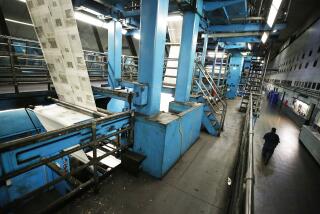Moving Decision : Smith Corona to Relocate Last U.S. Factory
- Share via
Blaming inadequate U.S. government action to combat dumping by Japanese word processor makers, Smith Corona announced Tuesday that it was shutting down its last U.S. manufacturing plant and moving it to Mexico, eliminating 875 jobs in Cortland, N.Y.
Smith Corona Chairman G. Lee Thompson blamed lax enforcement of U.S. trade laws for forcing the company’s move to Mexico. “Foreign competition is moving in and clearing out manufacturing in the U.S.,” he said in a telephone interview Tuesday.
But employees and industry analysts questioned why a company with improving income and steady market share needed to move jobs to Mexico. In an earnings statement released Tuesday, the company said its net income for the fiscal year ending June 30 increased 13% over the previous year.
“What bothers us is that you look at their stocks and earnings and they’re going up,” Alan Parker, a toolmaker with Smith Corona for 27 years, told the Associated Press.
The move follows more than a decade of trade acrimony and price wars in the typewriter/word processor industry. In the 1970s, Smith Corona accused Japan-based competitor Brother Industries of dumping typewriters below cost in the U.S. market, and starting in 1980 Brother was forced to pay stiff duties on its exports after the U.S. government found its pricing was unfair.
Brother then turned around and brought a complaint--as a U.S.-based manufacturer with a plant in Tennessee--that Smith Corona was dumping its Singapore-made typewriters at below cost in the U.S. market.
The U.S. International Trade Administration denied Brother’s petition because it found that the company’s assembly-only factory did not qualify it to make a complaint as an “American manufacturer.” But Brother had made its point: Smith Corona, which is 48% owned by British firm Hanson, is also an international manufacturer.
In a Tuesday news conference in the Upstate New York community where Smith Corona has been a business pillar for four decades, President and Chief Operating Officer Bill Henderson said, “We can’t remain competitive in Cortland.
“We tried restructuring, we tried product redesign, we tried cost-cutting, but there’s nothing more we can do,” he told the Associated Press. “It’s an American tragedy.”
Cortland had already lost more than 3,000 jobs to layoffs at the 110-year-old company in the last decade.
Employees and some industry analysts took a dim view of the company’s decision to move to an as-yet-undisclosed location in Mexico.
“I have perceived Smith Corona to be the low-cost producer worldwide. Why are they throwing in the towel? They are making more money selling (word processors and typewriters) than anyone else,” said Tony Russ, an analyst at Dominick & Dominick. He said that despite competition, Smith Corona has roughly maintained its market share over the last five years: just over half of the U.S. market.
Smith Corona’s net income for the fiscal year ended June 30 rose about 13% to $22.1 million compared with the year before. Earnings had declined in 1990 and 1991 from a high of $42 million in 1989.
“The place is making money, just not as much as they want. We can’t help but feel they’re dumping on us and going somewhere for a better profit,” said toolmaker Parker.
Cortland Mayor Ronald Walsh Jr. said it was hard not to feel “a certain sense of betrayal” toward Smith Corona.
The price of Smith Corona shares rose early in New York Stock Exchange trading on news of the factory move, which is expected to begin in two months. But by the end of trading, the company’s stock was down 38 cents to $7.38. Stock analyst Russ said investors saw the move as a sign that Smith Corona expects slower sales growth and feels it must cut costs to maintain earnings.
The company said it would cost $15 million to move the manufacturing operations and that the shift would save $15 million a year.
More to Read
Inside the business of entertainment
The Wide Shot brings you news, analysis and insights on everything from streaming wars to production — and what it all means for the future.
You may occasionally receive promotional content from the Los Angeles Times.










